
Current Research in Toxicology
Scope & Guideline
Connecting Theory and Practice in Toxicology
Introduction
Aims and Scopes
- Mechanistic Toxicology Studies:
Research that delves into the underlying mechanisms of toxicity caused by chemicals, biological agents, and environmental pollutants, often employing advanced cellular and molecular techniques. - Developmental and Reproductive Toxicology:
Investigation into how exposures during critical developmental periods can affect reproductive health and developmental outcomes, utilizing in vivo and in vitro models. - Environmental Toxicology:
Studies assessing the toxic effects of environmental contaminants on ecosystems and human health, including the impact of pollutants on wildlife and ecosystems. - Computational Toxicology:
Utilization of computational methods to predict toxicological outcomes, including the development of quantitative structure-activity relationship (QSAR) models and other in silico approaches. - Regulatory Toxicology:
Research aimed at supporting regulatory decision-making processes through the evaluation of chemical safety, risk assessment, and the development of guidelines for toxicological testing. - Neurotoxicology:
Focus on the effects of toxic substances on the nervous system, including studies on neurodevelopmental toxicity and neurodegenerative diseases.
Trending and Emerging
- Emerging Contaminants and Mixtures:
Research is increasingly focusing on the effects of emerging contaminants, such as microplastics and pharmaceuticals, as well as the interactions between multiple chemical exposures. - Mechanisms of Ferroptosis and Other Novel Cell Death Pathways:
Ferroptosis, a form of regulated cell death associated with iron and reactive oxygen species, is gaining recognition as a significant area of study in various toxicological contexts. - Use of Advanced In Vitro Models:
There is a growing trend towards the use of sophisticated in vitro models, including 3D cultures and organ-on-a-chip technologies, to better mimic human physiology and predict toxicological outcomes. - Focus on Epigenetics and Toxicology:
Studies exploring the role of epigenetic modifications in toxicological responses are on the rise, indicating a shift towards understanding how environmental factors can alter gene expression. - Integration of Machine Learning in Toxicology:
The adoption of machine learning techniques to analyze toxicological data and predict outcomes is emerging as a pivotal trend, enhancing the efficiency and accuracy of toxicological assessments.
Declining or Waning
- Traditional Toxicological Testing Methods:
There is a noticeable reduction in research employing conventional animal testing methods, as the field moves towards alternative approaches such as in vitro and computational models. - Single Chemical Toxicity Studies:
Research that focuses solely on the toxicity of individual chemicals is decreasing, as there is a growing emphasis on understanding the effects of chemical mixtures and multi-exposure scenarios. - General Reviews on Established Toxicants:
While reviews are essential, there is a decline in general reviews of well-established toxicants, with a shift towards more specific and innovative topics that explore novel compounds and mechanisms.
Similar Journals

Molecular & Cellular Toxicology
Advancing the understanding of toxicological impacts at the cellular level.Molecular & Cellular Toxicology, published by the Korean Society Toxicogenomics & Toxicoproteomics (KSTT), is a significant journal in the field of toxicology, providing crucial insights into molecular mechanisms underlying toxic responses. With an ISSN of 1738-642X and E-ISSN 2092-8467, this journal serves as a vital platform for researchers, professionals, and students interested in the latest findings and advancements in toxicology, health, and environmental science. Although it operates under a subscription model, it maintains rigorous peer review standards, contributing to its respectable Q3 classification in Health, Toxicology and Mutagenesis, and its Q2 standing in Pharmacology, Toxicology, and Pharmaceutics. The journal, intersecting with innovative aspects of pharmacology and public health, aims to foster a deeper understanding of toxicological impacts on cellular processes and overall health. Located in Germany and supported by a dedicated editorial board, Molecular & Cellular Toxicology stands out in the academic community, encouraging interdisciplinary discourse and collaboration to address critical toxicological challenges. Engage with us for cutting-edge research that informs and shapes the future of toxicological science.
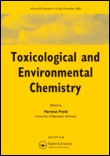
TOXICOLOGICAL AND ENVIRONMENTAL CHEMISTRY
Transforming research into actionable insights for sustainability.TOXICOLOGICAL AND ENVIRONMENTAL CHEMISTRY is a pivotal journal published by Taylor & Francis Ltd, addressing critical intersections between environmental chemistry and toxicology since its inception in 1979. With its ISSN 0277-2248 and E-ISSN 1029-0486, the journal serves as a platform for rigorous research and innovative methodologies in pollution control, health implications of environmental chemicals, and the broader spectrum of toxicological studies. Although it currently does not offer open access, the journal's impact in the field is underscored by its Category Quartiles rankings in 2023, placing it in Q3 across Environmental Chemistry, Health, Toxicology and Mutagenesis, and Pollution categories. Furthermore, its Scopus rankings reveal its significant role within the scientific community, specifically in areas such as Environmental Science and Toxicology. The journal aspires to foster multidisciplinary dialogue and advance knowledge that contributes to environmental sustainability and public health, making it an essential resource for researchers, professionals, and students dedicated to these fields.
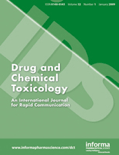
DRUG AND CHEMICAL TOXICOLOGY
Bridging disciplines for safer environments.Drug and Chemical Toxicology is a well-respected journal in the fields of toxicology, pharmacology, and public health, published by Taylor & Francis Ltd. Since its inception in 1978, this journal has diligently explored the effects and mechanisms of chemical exposures on health and the environment, fulfilling a crucial role in advancing scientific understanding and safeguarding public health. The journal is indexed across prestigious databases and features an impressive array of articles categorized within the Q2 and Q3 quartiles across various categories in 2023, reflecting its significance in Chemical Health and Safety as well as Environmental and Occupational Health disciplines. With an extensive reach and a focus on interdisciplinary research, Drug and Chemical Toxicology offers a rich repository of original research, reviews, and methodological advancements, catering to a diverse audience of researchers, professionals, and students dedicated to the betterment of safety and health standards. Although not an open-access publication, its articles are widely accessible to the academic community, ensuring that critical innovations and insights are shared for the greater good.

CHEMICAL RESEARCH IN TOXICOLOGY
Exploring the intricate relationship between chemistry and health.Chemical Research in Toxicology is a premier journal published by the American Chemical Society, dedicated to advancing the understanding of toxicological effects associated with chemical substances. Since its inception in 1988, this esteemed journal has maintained a robust impact factor, ranking in the Q1 quartile for both Medicine (miscellaneous) and Toxicology as of 2023, reflecting its significance and influence in the fields of pharmacology and toxicology. With an impressive Scopus ranking at #16 out of 133 in the Toxicology category, it serves as a vital resource for researchers, professionals, and students seeking cutting-edge insights and scholarly articles that bridge the gap between chemistry and toxicological science. Although not an open-access publication, it continues to provide comprehensive analyses and original research that inform safe chemical practices and regulatory policies, further enhancing its role in public health and safety.

TOXICOLOGY
Elevating research in toxicology to safeguard public health.TOXICOLOGY, published by Elsevier Ireland Ltd, is a prestigious peer-reviewed journal specializing in the field of toxicology. With an ISSN of 0300-483X and an E-ISSN of 1879-3185, this journal provides a vital platform for researchers, professionals, and students to disseminate and access groundbreaking studies from 1973 to present, with a convergence set until 2024. Recognized for its high impact, it holds a Q1 ranking in Toxicology category and ranks #18 out of 133 in Scopus's sector of Pharmacology, Toxicology, and Pharmaceutics, placing it in the 86th percentile. While the journal is not open access, it nonetheless offers a rich collection of research articles that enhance the understanding of toxicological science and its applications. The journal's objectives encompass advancing knowledge in the toxicological evaluation of substances, promoting safety in public health, and fostering dialogue among scholars. As a key resource in the field, TOXICOLOGY plays a crucial role in advancing research and informing practices related to toxicological risks and safety assessments.

Toxicological Research
Innovating research to unveil the mysteries of toxicology.Toxicological Research is a prominent academic journal dedicated to advancing the field of toxicology through rigorous exploration and innovative research. Published by the Korean Society of Toxicology, this journal serves as a vital resource for researchers, professionals, and students engaged in environmental science, pharmacology, and toxicology. With an ISSN of 1976-8257 and an E-ISSN of 2234-2753, Toxicological Research highlights significant findings and discussions in the realm of health, toxicology, and mutagenesis. Although not an open-access journal, it maintains a solid reputation as evidenced by its Q3 ranking in both health-related toxicology and general toxicology categories for 2023. The journal covers a broad spectrum of topics from fundamental research to applied toxicology and provides a unique platform for the dissemination of knowledge in a field that is increasingly relevant in today’s society. With an anticipated convergence period from 2008 to 2024, Toxicological Research continues to contribute vital insights to understanding the implications of toxic substances on health and the environment.
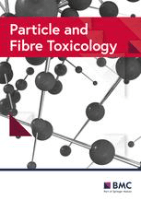
Particle and Fibre Toxicology
Exploring the intricate world of toxicology.Particle and Fibre Toxicology is a leading open-access journal dedicated to advancing the field of toxicology, specifically focusing on the health impacts of particulate matter and fibers. Published by BMC since 2004, this journal operates from its offices in the United Kingdom and has gained significant recognition in the scientific community, achieving an impressive impact factor that highlights its relevance and influence. As indicated by its Q1 ranking in various categories including Health, Toxicology and Mutagenesis and Medicine (miscellaneous), it occupies a prestigious position in the academic landscape, appealing to researchers, professionals, and students alike. With a Scopus ranking of #4 in Toxicology and #7 in Environmental Science, the journal ensures high visibility and accessibility, providing a platform for the dissemination of key research findings and innovative methodologies in the interdisciplinary domains of toxicology. Through its commitment to open access, Particle and Fibre Toxicology fosters knowledge-sharing and collaboration, facilitating significant advancements in our understanding of the toxicological effects of environmental agents.
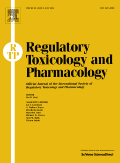
REGULATORY TOXICOLOGY AND PHARMACOLOGY
Unveiling Insights in Toxicological and Pharmacological PracticesREGULATORY TOXICOLOGY AND PHARMACOLOGY is a prestigious peer-reviewed journal published by Academic Press Inc. Elsevier Science, dedicated to advancing knowledge in the fields of toxicology and pharmacology. With an esteemed impact factor and a current ranking of Q2 in both Medicine and Toxicology, this journal serves as a critical resource for researchers, professionals, and students interested in the regulatory aspects of drug safety and environmental toxicology. The journal publishes original research articles, reviews, and regulatory updates that reflect the latest insights and methodologies in safety assessment and toxicological research. Established in 1970, the journal continues to play an integral role in shaping the scientific discourse around regulatory practices in pharmacology, ensuring that both academic and practical perspectives are captured. Readers can access the articles through subscription services, allowing them to stay informed of the most significant developments in the field.
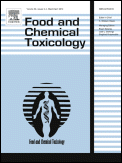
FOOD AND CHEMICAL TOXICOLOGY
Exploring the critical links between food safety and public health.FOOD AND CHEMICAL TOXICOLOGY, published by Pergamon-Elsevier Science Ltd, is a prestigious journal with a significant impact in the fields of food science, medicine, and toxicology, reflecting its Q1 and Q2 quartile rankings in various categories as of 2023. Established in 1982, this journal continues to serve as an essential platform for disseminating high-quality research focused on the toxicological assessment of foods and chemicals, aiming to advance knowledge that affects public health and safety. With a pivotal role in integrating diverse disciplines, including pharmacology and agricultural sciences, the journal ranks impressively within the top percentiles—specifically 95th in Toxicology and 92nd in Food Science on the Scopus metrics. Though it operates on a traditional subscription model, the journal is committed to providing valuable insights and findings to researchers, professionals, and students across the globe, making it a vital resource in the ongoing discourse around food safety and environmental health. Its comprehensive scope underscores its importance in shaping evidence-based policies and practices.
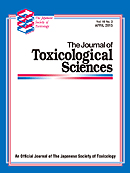
JOURNAL OF TOXICOLOGICAL SCIENCES
Fostering Collaboration in Toxicological ResearchThe Journal of Toxicological Sciences, published by the Japanese Society of Toxicological Sciences, is a prominent academic journal dedicated to the comprehensive study of toxicology and its related fields. Since its inception in 1976, the journal has provided a vital platform for researchers and professionals to disseminate innovative findings and insights in toxicology, with a focus on both experimental and clinical studies. Positioned in the Q3 quartile across various relevant categories, including Medicine (miscellaneous) and Toxicology as of 2023, the journal plays an essential role in advancing our understanding of toxic substances and their effects on biological systems. Although currently not open access, the journal maintains high academic standards and is indexed in Scopus, ranking #96 in Toxicology. Offering unique perspectives from Japan, it encourages global collaboration and discourse among toxicologists, making it an invaluable resource for students, researchers, and industry professionals alike.